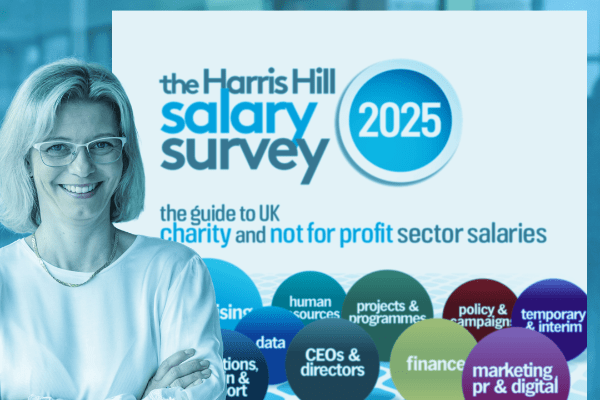It's fair to say that 2020 has been a year like no other. The ongoing COVID-19 pandemic has forced organisations to make urgent and substantial changes to how they operate, sometimes overnight. The majority of the workforce are based from home and productivity, motivation and wellbeing have taken a hit.
So how can charities support their biggest asset — their people — during the pandemic and nurture a company culture that’s stronger than ever?Freelance Writer Nicola Greenbrookfinds out.

Nurturing a strong company culture during COVID-19
The coronavirus pandemic is having a devastating impact on many charities and volunteers. In November 2020,the NCVO’s monthly COVID-19 voluntary sector impact barometerreported that 39% of the organisations reported their financial position had deteriorated in the last month.
The pandemic has also altered people’s working lives dramatically. For the VCSE sector it can feel particularly challenging due to the nature of work people are involved in. Being away from face-to-face services and juggling remote work and childcare with an increased demand for services can also lead to anxiety, stress and fatigue.
Company culture has always been important — but now, it's critical.
What exactly is company culture?
Quite honestly, it’s multifaceted and there are several definitions. Can you describe your company culture in a few words? It can be difficult to characterise, but many people remember exactly how good or bad culture feels.
The CIPDexplains that, 'the way an organisation operates drives its employer brand, helping to attract and retain talented people who want to be part of a great place to work, and who will in turn thrive in the business’.
Company culture is the backdrop for everything. It embodies the way people behave and think at work, their mindsets and even their emotions. For a charity, it could be the key practices that reflect its mission and values, directly linked to a broader social purpose — and not just the perks, free fruit or fun stuff. Cultivating a strong company culture can also mean encouraging a strong work ethic and healthy behaviours and attitudes.

Why is it so important , especially now?
Glassdoor believes that 2020 has heralded ‘a culture-first decade for employers’ that puts employees at the forefront of the modern corporation. Having a strong workplace culture has been verifiably linked to better financial performance, increased talent attraction and improved service-user satisfaction.
In times of adversity like the current pandemic, and when foundations are unstable, it can shine the spotlight on bad practices such as poor communication, a lack of empathy and poor leadership. This can lead to low productivity, a disengaged workforce and high turnover; creating extra work — and costs — for charities.
One in five (21%) Brits quit their jobs due toxic workplace cultureand no matter how big or small the charity, if your company culture is brittle it will dictate how your people behave and perform — regardless of the economic climate.
How can we nurture a strong company culture?
A difficult year may be drawing to a close, but it could still be months before working life returns to the way it was, if at all. So, what lessons can we learn from the pandemic about company culture, and what can we take with us into next year?
1. Flexibility, trust and care
The work-home divide is blurred right now; so it’s crucial that charities support their people to work flexibly and balance their other commitments, and continue to show and build trust.
In a survey for the CIPD conducted by YouGovin April 2020, 3 in 10 surveyed found it hard to fulfil commitments outside of work due to time spent on their job. This increases to 4 in 10 for those also juggling increased caring responsibilities.
Line managers should work to understand individual needs and, crucially, keep the emphasis on work outcomes, rather than hours put in. While managers should empower people to work a pattern that suits their individual circumstances for now, they should keep an eye on overall working hours or if emails are being sent late at night. Check in, and gently challenge when necessary, if the signs of burn out are starting to show.
Now, more than ever, is the time for companies to show empathetic leadership, despite very challenging circumstances. Many people have contracted the virus, lost their loved ones, or have children at home from school isolating. Some may be missing their office and colleagues or even to be ‘grieving' for life before COVID-19. Managers should be encouraged to have open and honest check-ins with their teams during the pandemic (‘how are you, really?’), without being intrusive.
Thirtyone:eight, a Christian charity based in Kent, was awarded first place in theBest Charities to Work for 2020 inaugural list by Third Sector. Its joint-CEO, Steve Ball, stated that key to its success has been "creating a culture of care and compassion for all", likening the charity to an extended family who "genuinely care for each other and look after each other”.

2. Creative thought and connection
With the novelty of Zoom meetings wearing thin, the risk of some employees fading into the background in larger charities and the absence of face to face contact leading to feelings of isolation, communication is vital to keep a strong company culture intact. In a huge time of uncertainty around the future of organisations and roles, it can help people to cope.
Consider creative ways to maintain a connection with your staff and volunteers and involve them in potential decisions, making them feel they’re being ‘seen’. Take it beyond company updates; like employee-written guides on surviving homeworking, book clubs, and internal channels for people to share what they're listening to/watching. Rather than a distraction, these can provide a way to connect and engage, maintain a sense of community and encourage creativity. Good quality communication could reduce anxiety or uncertainty and tackle loneliness.
3. A focus on wellbeing
In a recent ONS surveyit was found that around a third of men and women were concerned about the impact of COVID-19 on their work. However, health — both mental and physical — and wellbeing must also be a key focus during the pandemic.
As well as practical steps, like reminding staff to take breaks and use annual leave, charities should encourage line managers to include wellbeing as a core part of any 1:1s or work-based conversations. This could help to spot early signs of low motivation, or fatigue before it becomes an issue.
In Mind'sMental Health at Work Commitment Guide for Employers During Coronavirus, the charity offers practical examples of what employers can do to support their teams and effectively respond to the current pandemic, including the promotion of an open culture around mental health.

Here are some other ways to support staff and strengthen company culture during the ongoing pandemic:
Create a ‘culture team’; responsible for planning virtual events so there’s always something to look forward to (especially during the winter months). This can help shape company culture, rather than people feeling they have to adapt to it.
Don't neglect training; now could be the perfect time to encourage upskilling and capability-building and tooffer training on managing mental health at work, such as via Mind.
Remind people of the support mechanisms available to them, such as HR, mental health first aiders and employee assistance programmes.
Celebrate successes and great work with virtual reward and recognition; asking colleagues to vote for each other also gives a much needed boost and could improve employee engagement
Coronavirus will have a long-lasting impact on our working lives and nurturing a strong company culture will be critical to ensure your people remain well, engaged and productive — and on board.
Steering teams through uncertain territory can be hard work; but creating an environment where staff feel valued, where you refine and stay true to your core values and where people feel their wellbeing is looked after, will enable charities to not only survive, but to thrive.
To come back even stronger than ever.

More from Nicola Greenbrook |  | ||
More from the Harris Hill blog |  | ||
-

Opportunity for all
Find out how we’re working to deliver more diverse, equitable and inclusive recruitment…
-

Recruiting a charity CEO?
Our executive recruitment specialists have an exceptional record of successful CEO, chair, trustee and…
-

Charity sector salaries
Our 2025 Salary Survey has the latest rates and expert insight for roles throughout the sector.













